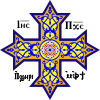
Anthony the Great was a Christian monk from Egypt, revered since his death as a saint. He is distinguished from other saints named Anthony, such as Anthony of Padua, by various epithets: Anthony of Egypt, Anthony the Abbot, Anthony of the Desert, Anthony the Anchorite, Anthony the Hermit, and Anthony of Thebes. For his importance among the Desert Fathers and to all later Christian monasticism, he is also known as the Father of All Monks. His feast day is celebrated on 17 January among the Eastern Orthodox and Catholic churches and on Tobi 22 in the Coptic calendar.

Pachomius, also known as Saint Pachomius the Great, is generally recognized as the founder of Christian cenobitic monasticism. Coptic churches celebrate his feast day on 9 May, and Eastern Orthodox and Roman Catholic churches mark his feast on 15 May or 28 May. In the Lutheran Church, he is remembered as a renewer of the church, along with his contemporary, Anthony of Egypt on 17 January.
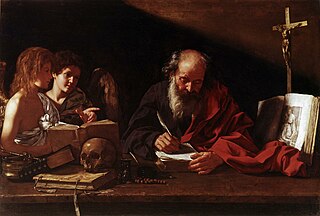
A hermit, also known as an eremite or solitary, is a person who lives in seclusion. Eremitism plays a role in a variety of religions.

Moses the Black, also known as Moses the Strong, Moses the Abyssinian, Moses the Robber, and Moses the Ethiopian, was an ascetic monk and priest in Egypt in the fourth century AD, and a Desert Father. He is highly venerated in the Eastern Orthodox Church and the Oriental Orthodox Church. According to stories about him, he converted from a life of crime to one of asceticism. He is mentioned in Sozomen's Ecclesiastical History, written about 70 years after Moses's death.

Onuphrius lived as a hermit in the desert of Upper Egypt in the 4th or 5th centuries. He is venerated as Saint Onuphrius in both the Roman Catholic and Eastern Catholic churches, as Venerable Onuphrius in Eastern Orthodoxy, and as Saint Nofer the Anchorite in Oriental Orthodoxy.
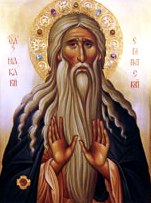
Macarius of Egypt was a Christian monk and hermit. He is also known as Macarius the Elder or Macarius the Great.

Saint Macarius of Alexandria was a monk in the Nitrian Desert. He was a slightly younger contemporary of Macarius of Egypt, and is thus also known as Macarius the Younger.

Sep. 10 - Eastern Orthodox liturgical calendar - Sep. 12

Sep. 12 - Eastern Orthodox liturgical calendar - Sep. 14
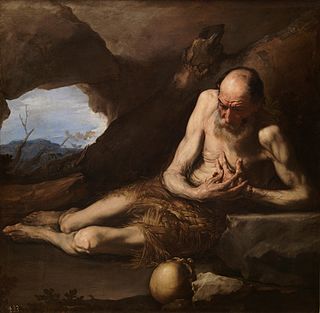
Paul of Thebes, commonly known as Paul the First Hermit or Paul the Anchorite, was an Egyptian saint regarded as the first Christian hermit and grazer, who was claimed to have lived alone in the desert of Thebes, Roman Egypt from the age of sixteen to the age of one hundred and thirteen years old. He was canonized in 491 by Pope Gelasius I, and is venerated as a saint by the Catholic Church, Eastern Orthodox Church, and Oriental Orthodox Churches.

January 23 - Eastern Orthodox liturgical calendar - January 25
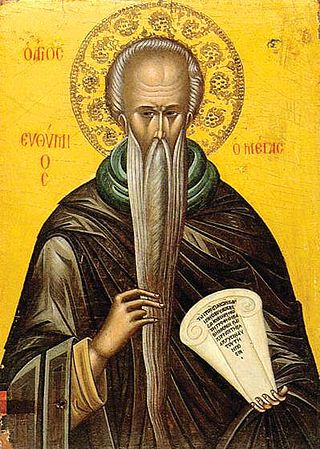
Euthymius the Great was an abbot in Palestine. He is venerated in both Roman Catholic and Eastern Orthodox Churches.

November 2 - Eastern Orthodox liturgical calendar - November 4
Saint Paphnutius the Ascetic, also known as Paphnutius the Hermit, was an Egyptian anchorite of the fourth century. He is most famous for his accounts of the lives of many hermits of the Egyptian desert, such as Saint Onuphrius.
Palladius of Antioch, also known as Saint Palladius the Desert Dweller and Palladius the Hermit, was an Orthodox and Catholic saint in the Roman Empire. Palladius was a hermit in the desert near Antioch. He was a friend of Saint Simeon. Palladius died in 390 of natural causes and was canonized in pre-Congregation times.
Venerable John the Hermit began his ascetic life at a young age according to records. He was born in the fourth century in Armenia to Juliana, a devout Eastern Orthodox Christian mother. John was the spiritual son of St. Pharmutius who discipled him for a time. Eventually, John chose to enter into a greater solitude, taking abode in the depths of a dry well where Pharmutius would bring him bread daily; bread provided by an angel according to sacred tradition.
Saint Pharmutius, according to the Prologue from Ohrid, was a hermit in the Egyptian desert and the spiritual mentor of Venerable John the Hermit of Armenia. Pharmutius' holiness was such that angels brought him his daily bread, which in Christian love he shared with his hermit brother John who lived in strict seclusion.
Venerable Zachariah the Recluse of Egypt was an Egyptian Christian monk who lived during the 4th century in Scetis, Lower Egypt. He is the patron saint of society's outcasts. He served the homeless and poor, and is remembered as a monastic father.

Chariton the Confessor was an early Christian monk. He is venerated as a saint by both the Western and Eastern Churches. His remembrance day is September 28.
Saint Thomas the Hermit is a Saint of the Coptic Orthodox Church, he is also known as "Saint Thomas the Anchorite", "Saint Thomas of Shenshif" or simply as "Abba Thomas"[(Coptic word meaning Father) (Αw-ba)Sahidic (Αw-va)Bohairic]. Saint Thomas was born in Upper Egypt, in a small village known as "Shenshif". He is revered by the Coptic Orthodox Church, since he is one of the early Anchorites, or Desert Fathers. Little is commonly known about him.










